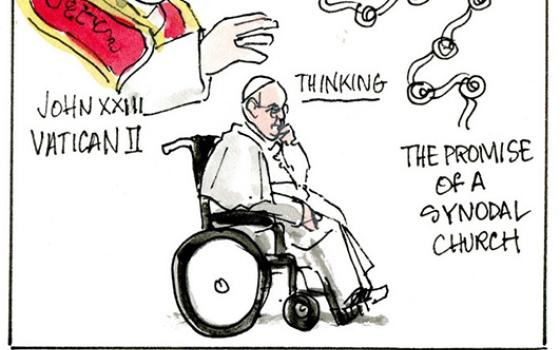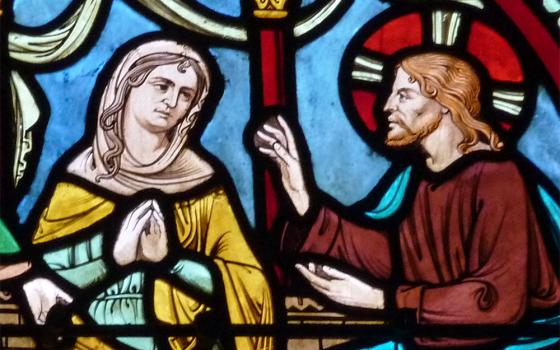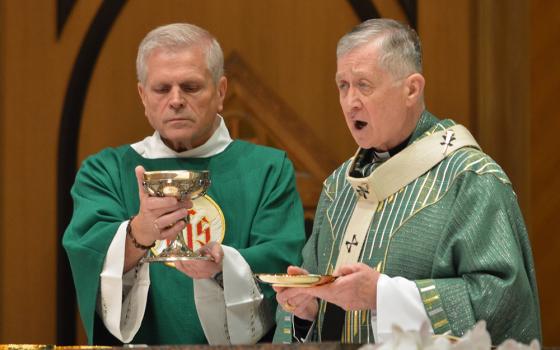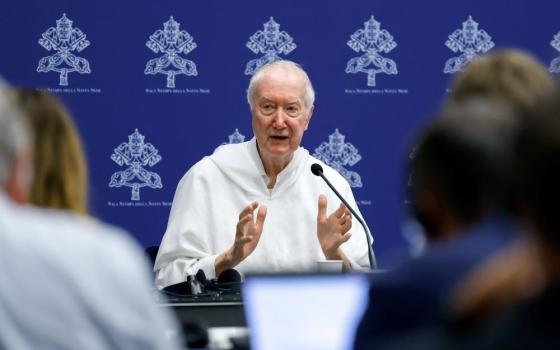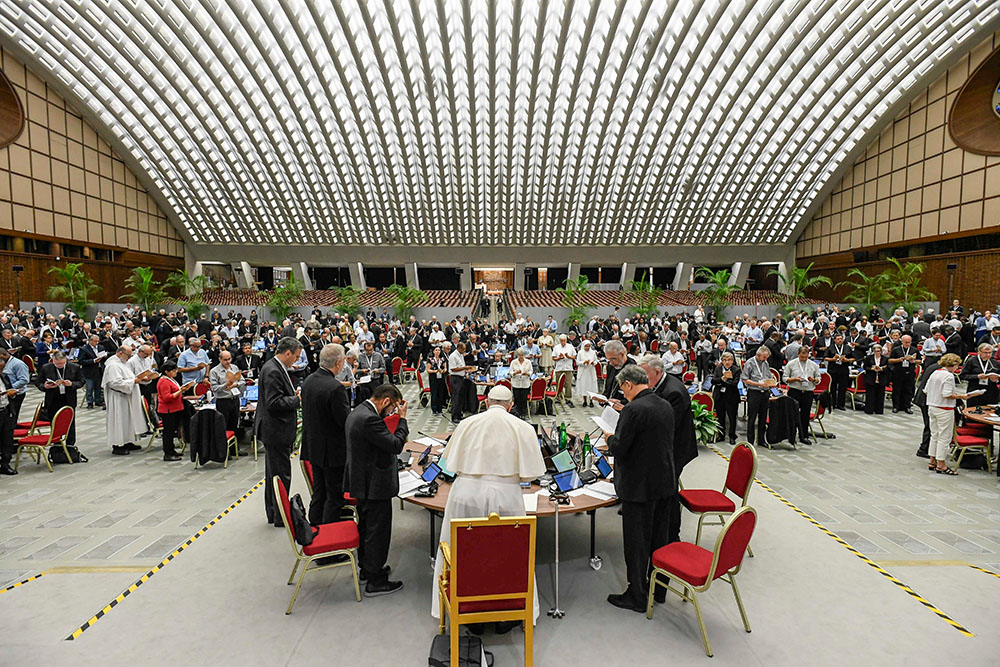
Pope Francis and members of the assembly of the Synod of Bishops begin their work with prayer Oct. 20, 2023, in the Paul VI Audience Hall at the Vatican. A daylong gathering at Georgetown University on March 13, 2024, sought to help U.S. church leaders understand that synodality "doesn't start at the Vatican but grows from the ground up." (CNS/Vatican Media)
Among the most infamous expressions to emerge out of American jurisprudence is Supreme Court Justice Potter Stewart's 1964 obscenity test: "I know it when I see it."
The same might also be said of synodality, a sometimes-jargony word used to describe the efforts to make the church more collaborative, less clericalist and better suited to listening to all of its members.
Pope Francis has utilized synodality as a primary means of church reform, but even after a decade into his papacy — and with five synods under his belt — the concept can often be hard to explain. As many participants at last October's synod on synodality said at the time, it just has to be done.
Canadian theologian Catherine Clifford put it succinctly on NCR's "The Vatican Briefing" podcast last fall by observing that Francis has "taken a wager that we will learn to do this, in the doing. We learn by doing."
That was the mindset that led Georgetown University's Initiative for Catholic Social Thought in Public Life to invite a range of leading U.S. church leaders, theologians and lay ministry heads to participate alongside some of the U.S. delegates to the Vatican's synod on synodality for a one-day synodal laboratory.
On March 13 — the 11-year anniversary of Francis' election — I joined some 30 participants for the daylong gathering inside the university's Riggs Library.
The setting was almost a microcosm of the Vatican's synodal hall, with roundtables for group discussion that were modeled after the "Conversations in the Spirit" that guided the synod process in Rome and built in time for prayer and silent reflection in between each round. Instead of the dome of St. Peter's towering next door, out the library window one could see the U.S. Capitol building in the distance.
The conference took place under the "Chatham House Rule," meaning that those taking part in the discussions were free to talk about them in public, but without identifying who made any particular comment. The rules are intended to encourage open and frank conversations (though, unlike the synod in Rome, the conference included the presence of several journalists in the room).
With a special focus on themes related to lay and women's leadership and the social mission of the church, the synodal gathering provided a forum for participants to ask questions and provide reflections on both successes and distresses within the church's structures and leadership that either advance or hinder that mission.
Advertisement
In the afternoon, roundtable conversations were structured around the themes of racial justice, economic justice, environmental justice, justice for migrants and "a better kind of politics," in reference to Francis' 2020 encyclical, Fratelli Tutti.
And like of the Vatican synod process, the ideas and issues that emerged were wide-ranging:
- The isolation of bishops from much of their flock, but the possibility of synodality serving as an antidote to this issue;
- The widespread loss of trust in institutions, including the Catholic Church, which has weakened the church's ability to speak in the public square;
- The need to create more spaces for dialogue, including with "synod skeptics";
- How to better put money at the service of the Gospel, and the issue of wealthy U.S. Catholics who use their financial resources for access and influence over church leaders;
- Concerns about rising tides of clericalism, including fears that the laity may sometimes empower clerical culture by defaulting to or preferring priests and bishops to lead church initiatives;
- The lack of lay involvement in the formation of U.S. seminarians;
- A desire for the church to provide more spaces to learn from its Indigenous members, survivors of clergy abuse, and others whose voices have not been heard;
- The inability of the U.S. church to embrace the 2015 encyclical Laudato Si' and the pope's environmental teachings;
- The retention of younger members and how the church can still minister to young Catholics who may not attend Mass, but still identify as Catholic.
Kim Daniels, director of Georgetown's initiative, a member of the Vatican's Dicastery for Communications and the Synod Communications Commission, told me that the gathering — which was organized alongside the university's Berkley Center for Religion, Peace and World Affairs — came in part from being present at the first session of the synod on synodality in Rome and wanting to bring that experience with her back home.
"The charge of the synod, the charge of Pope Francis, was to make an effort where we are, where we live, where we work, to deepen our communion and broaden participation in the church, and most of all to best live out the mission of serving Jesus Christ by living out the Gospel," said Daniels.
John Carr, founder of the initiative, admitted to me that initially he was not excited about the synod process, but now describes himself as a "convert" because of "what it represents in terms of broadening decision-making in the life of the church."
Quoting British theologian Anna Rowlands, he said the synod process is about an "outward-facing church that's healthy on the inside."
Taking stock of the daylong Georgetown gathering, Carr said that "hierarchs, academics, leaders of organizations don't usually spend a lot of time listening."
"This modeled how that can happen in a way that can enrich their leadership and service of the church," he said.
Daniels said, "At Georgetown, the nation's oldest Catholic and Jesuit university, we wanted to make a distinctive contribution to help synod leaders, social mission leaders and lay leaders." She noted that in the yearlong interval between the two Rome sessions on the synod, this gathering was a chance to ask "how do we best live out 'the beating heart of the Gospel' in our own backyard?"
Because synodality, she added, "is something that doesn't start at the Vatican but grows from the ground up."





